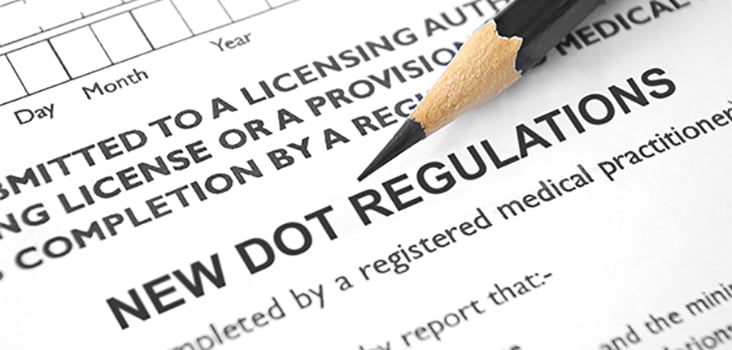
10 Things Drivers Need to Know about the New DOT Regulations
On November 13, 2017, the Department of Transportation (DOT) published a final rule that changes its drug testing program regulation. The rule was added to meet new Health and Human Services (HHS) drug testing guidelines, and to help combat the opioid epidemic. Some of these changes may have a big impact on drivers and service agents like collectors, labs, TPA’s, and MRO’s, so it’s important to stay informed and learn about them if you haven’t already.
Here’s a list of 10 things you need to know about the new regulations.
1. New year, new DOT drug tests
The new testing standards went into effect on January 1, 2018.
2. Four new drugs being tested
The main feature of the new rule is that four semi-synthetic opioids have been added to the testing panel: hydrocodone, oxycodone, hydromorphone, and oxymorphone.
3. Out with the old, in with the new
The DOT removed MDEA from the drug test panel and added MDA in its place.
4. Impact on Third-Party Administrators (TPA’s)
The employer or TPA is no longer required to submit blind specimens to laboratories. This is intended to relieve unnecessary costs and administrative burdens.
5. Impact on urine collectors
The collector will discard the employee’s urine sample if they don’t provide the necessary amount by the end of the three-hour wait period. This modifies the “shy bladder” procedure.
6. Impact on testing laboratories
HHS-certified labs need to alter the drug testing panels to include the four new opioids and replace MDEA with MDA. They’ll need to modify the reports provided to employers and the DOT to reflect the panel changes.
Labs will also add three more reasons as to why a specimen could be reported as ‘rejected for testing’: (1) there is no Custody and Control Form (CCF); (2) two separate collections were performed using one CCF; and (3) there was no specimen submitted to the lab with the CCF.
7. Impact on Medical Review Officers (MRO’s)
Several of the MRO drug test review processes were modified, including a clarification on the term ‘prescription,’ an allowance to conduct additional testing to verify test results, and a small change in the timing for when they communicate a significant safety risk.
8. Stick to urine samples
The rule includes a new section clarifying that only urine samples can be collected and analyzed for the DOT drug testing program.
9. Check out the ODAPC website
A lot of information is moving to the Office of Drug & Alcohol Policy & Compliance (ODAPC) website, including:
- List of Substance Abuse Professional certification organizations
- Management Information Systems (MIS) data collection instructions
- List of National Highway Traffic Safety Administration (NHTSA) approved Alcohol Screening Devices and Evidential Breath Testing Devices
Also, collectors, alcohol testing technicians, MRO’s, and Substance Abuse Professionals are required to subscribe to ODAPC’s list-serve. The list-serve is free to subscribe to, and is a valuable source of information for drug testing rules, updates, and guidance on handling common issues.
10. A 2016 regulation is in effect this year
Although unrelated to the new drug test regulations, another important DOT rule is going into effect this year. Starting in July 2018, drivers will no longer be required to carry a medical card or submit it to the state for licensing. The electronic registry will verify certification.
As a result of this new rule, Concentra is updating its processes to meet the new regulation. This new change primarily impacts those employers covered by DOT regulations and those using a DOT look-alike for non-regulated testing. Concentra utilizes HHS certified laboratories who are prepared to follow the rule changes when they become effective. Additionally, all Concentra collectors will be subscribed to ODAPC’s list-serve by the effective date to ensure all screenings are compliant and meet the new regulations.
Concentra is equipped to keep you compliant with the new regulations, and offers DOT drug testing at all our 300+ locations across the country. Learn more about our comprehensive substance abuse management program, and talk to a Concentra work health expert to get the services you need.



